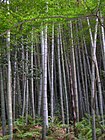Note: This is a project under development. The articles on this wiki are just being initiated and broadly incomplete. You can Help creating new pages.
Bambusoideae - Bamboos
The Bambusoideae are a subfamily of flowering perennial evergreen plants in the grass family Poaceae. Giant bamboos are the largest members of the grass family.
Uses
Parts Used
Chemical Composition
Amboo plant is a rich source of resins, arginine, silica, riboflavin, choline, thiamine.[1]
Common names
| Language | Common name |
|---|---|
| Kannada | Bidiru |
| Hindi | Baans |
| Malayalam | |
| Tamil | |
| Telugu | |
| Marathi | NA |
| Gujarathi | NA |
| Punjabi | NA |
| Kashmiri | NA |
| Sanskrit | |
| English | Bamboo |
Properties
Reference: Dravya - Substance, Rasa - Taste, Guna - Qualities, Veerya - Potency, Vipaka - Post-digesion effect, Karma - Pharmacological activity, Prabhava - Therepeutics.
Dravya
Rasa
Madhura (Sweet)
Guna
Shita (cool), Mridu (Soft), Snigdha (Unctuous), Bahala (Thick), Guru (Heavy), Manda (Mild), Prasanna (Pleasant)
Veerya
Shita (Cool)
Vipaka
Madhura (Sweet)
Karma
Prabhava
Manaskara (Pleasing to mind)
Habit
Identification
Leaf
| Kind | Shape | Feature |
|---|---|---|
| Alternate | Stipulate | The leaves are alternate, stipulate, paripinnate compound, very numerous, closely placed, rachis 8.8-12.5 cm long. |
.[2]
Flower
| Type | Size | Color and composition | Stamen | More information |
|---|---|---|---|---|
| Bisexual | 2.5 cm long | Bright yellow | 5-20 | The racemes are few-flowered, short, erect. |
Fruit
| Type | Size | Mass | Appearance | Seeds | More information |
|---|---|---|---|---|---|
| Short legume | 7.5–11 cm long, 1.5 cm broad | Clearly grooved lengthwise, Lowest hooked hairs aligned towards crown | Oblong, obtuse, tipped with long style base. | 12-20 seeds | {{{6}}} |
Other features
List of Ayurvedic medicine in which the herb is used
- Vishatinduka Taila as root juice extract
Where to get the saplings
Mode of Propagation
How to plant/cultivate
Many bamboos are popular in cultivation as garden plants, although care needs to be taken lest they take over the garden through their invasive behavior.[3]
Commonly seen growing in areas
Photo Gallery
References
External Links
- Ayurvedic Herbs known to be helpful to treat Ulcer
- Ayurvedic Herbs known to be helpful to treat Cancer
- Ayurvedic Herbs known to be helpful to treat Rhinorrhagia
- Ayurvedic Herbs known to be helpful to treat Diabetes
- Ayurvedic Herbs known to be helpful to treat Impotence
- Ayurvedic Herbs known to be helpful to treat Infertility
- Ayurvedic Herbs known to be helpful to treat Menstrual pains
- Herbs with Bamboo shoots used in medicine
- Herbs with Essential oils used in medicine
- Herbs with common name in Kannada
- Herbs with common name in Hindi
- Herbs with common name in English
- Habit - Grass or tree
- Index of Plants which can be propagated by Seeds
- Index of Plants which can be propagated by Cuttings
- Herbs that are commonly seen in the region of Diverse climate
- Herbs that are commonly seen in the region of Cold mountains
- Herbs that are commonly seen in the region of Hot tropical regions
- Herbs
- Poaceae




